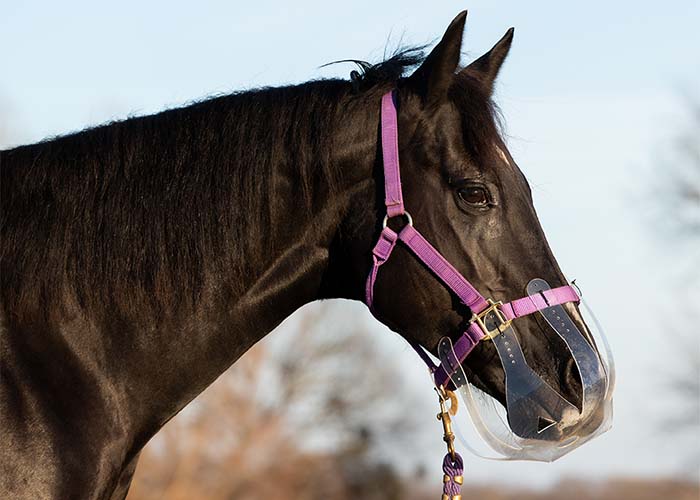
Every horse is a bit different, especially when it comes to their dietary needs. Some horses have slower metabolisms and tend to carry extra weight, no matter how much exercise they get or what their diet consists of. Many equestrians refer to these horses as “easy keepers,” but the fact is, they are not easy to keep at all! In fact, many of them are at an increased risk for laminitis and insulin resistance due to their weight. Horses and ponies with a slow metabolism require specialized management practices in order for them to thrive. In this blog post, we explore how to maximize the nutrition that you feed your horse while promoting weight loss.
Forage First
Even if you have an overweight horse, it is vital that you do not overly restrict the amount of forage that your horse receives, but you can slow the intake down. Generally, a horse or pony should eat 1.5% of their body weight in forage each day. For a 1,000 lb horse, this means that they need at least 15 lb of hay to ensure healthy digestive function. Because horses evolved as grazing animals, they are designed to have forage moving through their systems consistently.
By withholding forage from your horse, you can actually elicit a stress response. This can have a negative effect on your horse’s weight management efforts. According to Juliet Getty, Ph.D., an equine nutritionist, “Hunger and pain are extremely stressful. Acid flows continuously in a horse’s stomach; without forage to process, the acid causes ulcers and perhaps colic. This kind of stress releases the hormone cortisol, which increases insulin levels—which leads to fat storage, which leads to more insulin, and on, in a vicious cycle that makes the horse fatter.”
However, there are ways to decrease your horse’s caloric intake while still providing them with the forage that they need. Whenever possible, feed grass hay (timothy, orchard grass, etc.) instead of legume hay (such as alfalfa) or grain hay (like oat hay), this hay tends to be lower in nutritional value and calories. Look for chopped hay products that are designed to have low Non-Structural Carbohydrates (NSC), which mean the starch and sugar content in your hay. Many horses with Insulin Resistance (IR) or Equine Metabolic Syndrome (EMS) require low levels of NSCs to stay healthy. Lucerne Hi-Fiber Gold and Triple Crown Safe Starch Forage are both formulated with low levels of starch and carbohydrates, while still providing your horse with adequate nutrition.
Lucerne Hi-Fiber Gold Dengie
This forage has low sugar and low starch levels.
For horses eating traditional long-stem hay, a slow feeder will force them to eat more slowly and deliberately, which makes their hay rations last longer. Additionally, they also prevent hay waste. Slow feeder hay nets are great options for many horses, however, they are particularly effective for overweight horses. Check out the various slow feed hay net options that we carry, including the popular NibbleNet and Hay Chix Free Up Feeder. If your horse is turned out on pasture, consider outfitting them with a grazing muzzle to prevent overconsumption. To learn more about grazing muzzles and their benefits, refer to our blog post, Grazing Muzzles for Spring Pasture.
The NibbleNet
The 2″ or 1.5″ holes in the netting allow the horse to slowly “graze” for his food instead of gulping down large mouthfuls at once
Limit Grain
When helping your horse manage their weight, consider cutting back on the amount of grain that you feed. Grain can be an important piece of your horse’s diet; however, it is essential to research which formulas will serve your horse the best. Many grains are highly digestible forms of calories, which is important for muscle development but will add weight if too much is consumed. If you have an overweight horse, they do not need these additional calories.
Instead, consider feeding your horse a ration balancer. This concentrated form of grains is designed to be supplied in smaller quantities while still providing your horse with the vitamins, minerals, and amino acids that they need. This allows you to feed a much smaller amount of grain with fewer calories, while still meeting your horse’s dietary requirements.
Triple Crown 30% Ration Balancer
This pelleted vitamin and mineral feed is great for easy keepers not needing additional calories.
Supplemental Needs
For extremely overweight horses, it may be ill-advised to feed any grain. If your horse is an 8 or 9 on the Henneke Body Condition Score System, it is suggested that you work with your veterinarian to determine a diet for your horse. Many times, it is recommended that you remove grain entirely from their daily feedings as a way to drastically cut calories. However, you still need to ensure that your horse is still receiving the necessary levels of vitamins and minerals.
In order to provide your horse with these essential nutrients, there are a number of highly palatable supplements that can be fed to your horse. These complete supplements are a perfect compliment to a forage only diet. When shopping for a complete supplement, look for one with a low-fat content, which will help to cut down on the calories. Some horses will eat these supplements directly from their bucket, while others are a bit pickier. Try top dressing a handful of chopped forage or hay pellets in order to ensure consumption.
Additionally, there are a number of supplements that can be used in conjunction with a well-rounded diet to promote weight loss. Chromium supplements, such as Uckele GTF Chromium, help to support a healthy level of insulin within the body and help the bloodstream to remove excess glucose. Meanwhile, many overweight horses are magnesium deficient, so magnesium-based supplements, like Uckele Bioplex Magnesium, help their bodies to function better. New studies are also looking at magnesium’s ability to help horses reduce the size of fat patches in their necks, withers, and hind ends. Animed Remission is a unique product containing both magnesium and chromium, which has been shown to assist overweight horses or horses who are prone to founder.
Animed Remission
Remission contains magnesium and chromium, as well as seventy antioxidants, Omega-3 and Omega-6 fatty acids, and all of the essential amino acids.
Get Moving
Any time you are trying to have your horse lose weight, you need to make sure that they are expending more energy than they are consuming. By working your horse and helping them to build muscle, you can help them burn fat and increase their metabolism. Martin W. Adams, PhD, PAS, an Equine Nutritionist for Southern States explains, “Other benefits of daily exercise include an increase in metabolic rate, a possible reduction in appetite, and prevention of bone and mineral losses that may occur during calorie restriction when the horse is inactive.”
If your horse has been out of work for more than a few weeks, make sure that you gradually increase your horse’s fitness level to minimize the risk of injury. To learn more about the process of starting your horse in an exercise regime, refer to our blog post, Spring In Your Step: Returning Your Horse to Work.
Every horse is an individual and has specific dietary needs. Our friendly and highly-trained sales staff is always available to answer any questions you may have regarding your horse’s feeding program, ration balancers, and supplements that we carry. We encourage you to contact us to set up a complimentary equine nutrition consultation where we can help you take a multi-prong approach to build your horse’s diet to meet their nutritional requirements.

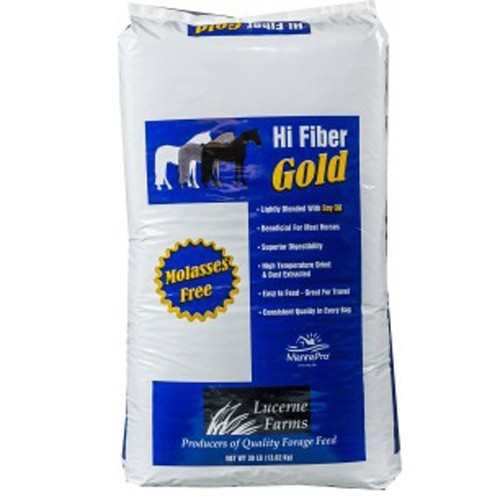
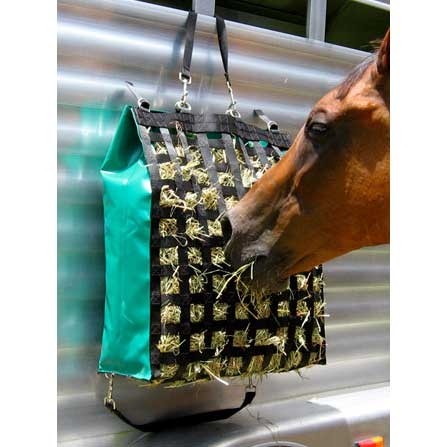
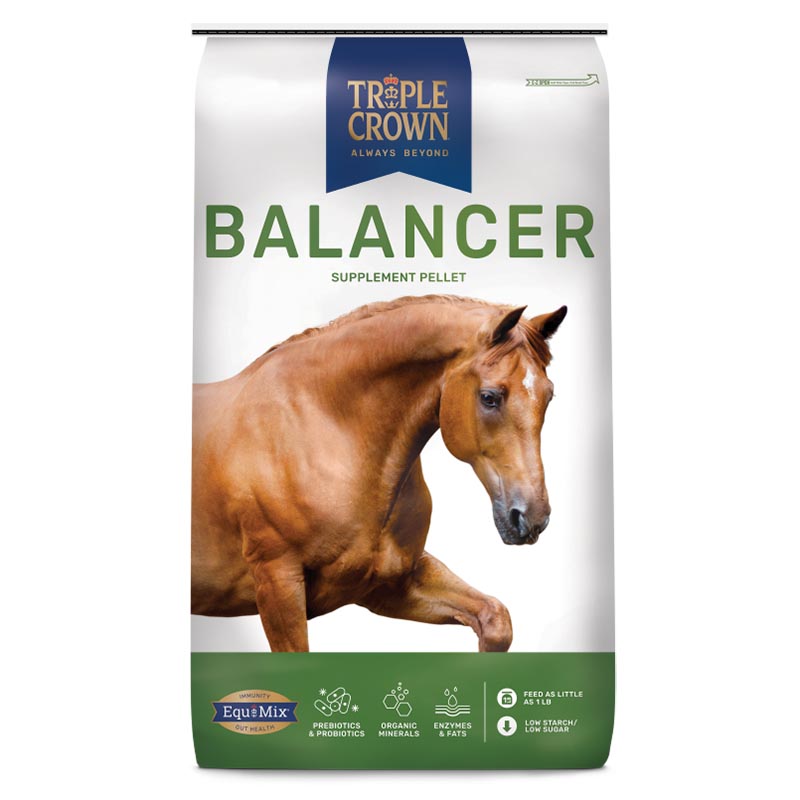
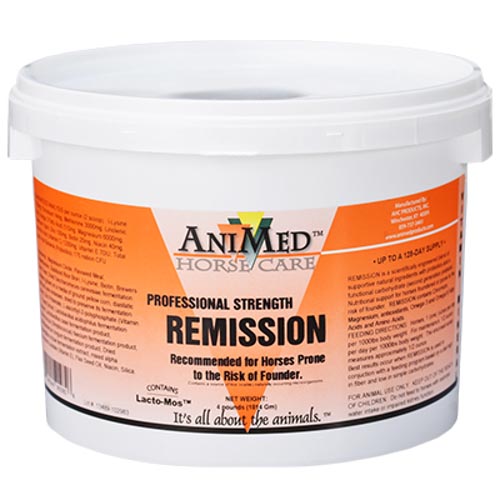
I can’t find any grass hay this year that isn’t full of buckhorns. My only option was grass/alfalfa hay. He is an easy keeper so I am having a hard time finding the right amount to feed.
He is 13h approx 525 lbs. I have reduced his hay to 4 lbs a day which I break between 4 feeding and supplement w/ Timothy pellets. Does anyone have any suggestions?
Hi Jennifer, thanks for reaching out; that is a difficult position to be in! In order to keep their digestive systems properly functioning, horses need to eat 1-2% of their body weight in forage each day. For your horse, that would mean that they should consume 5-10 pounds of forage a day (although more is optimal). To accommodate this, we would recommend looking into bagged chopped forage options, such as Triple Crown Premium Grass Forage or Lucerne Hi-Fiber Gold Dengie, which offer consistent quality. Hay pellets are another great way to supplement your horse’s forage intake.